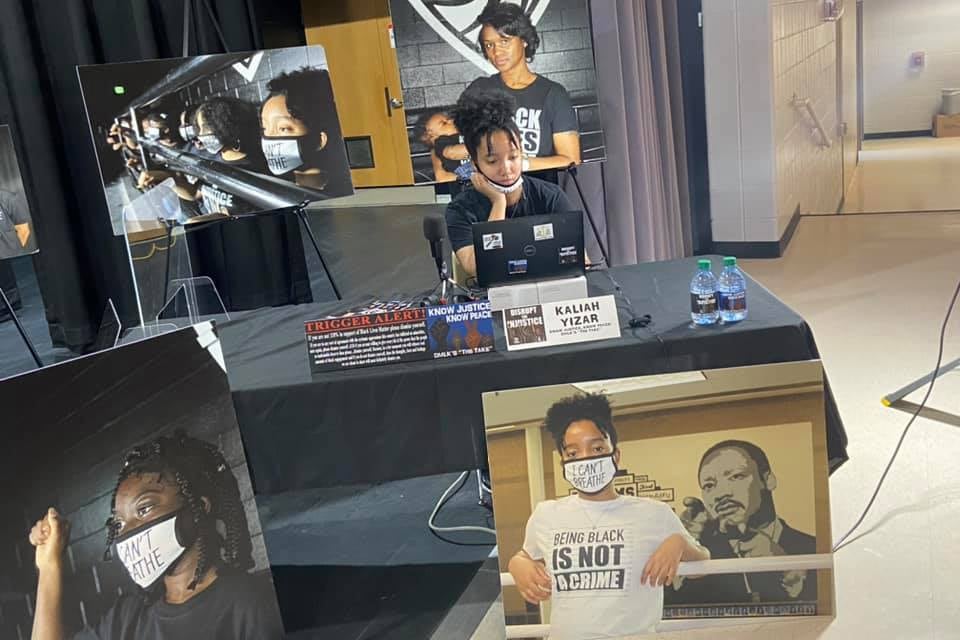Chalkbeat is a nonprofit news organization covering public education in communities across America. Sign up to receive the latest in education news straight to your inbox.
Update: Students suing over ‘Know Justice, Know Peace’ trademark speak out
Four young Black women who created a racial justice podcast and pushed Denver Public Schools to diversify its curriculum sued the district Monday. They allege Denver Public Schools unlawfully tried to trademark and steal the name of their podcast — Know Justice, Know Peace — “knowing full well the brand name was created by the students.”
“Shame on DPS,” the lawsuit says.
The lawsuit was filed in U.S. District Court on behalf of two graduates of Dr. Martin Luther King, Jr. Early College high school, Alana Mitchell and Jenelle Nangah, and two current students who are only identified by their initials because they are minors.
In July 2020, as the nation reckoned with racial justice and police brutality in the wake of the murder of George Floyd, the students released their first podcast episode. They shared the history of the Fourth of July and Juneteenth holidays, and their own experiences with racism.
“We wanted people to hear our voices,” Nangah told Chalkbeat at the time.
The podcast — the full name of which was Know Justice, Know Peace: DMLK’s The Take — attracted widespread media attention, including an appearance on The Today Show. The students’ advocacy pushed the Denver school board to pass a Know Justice, Know Peace resolution ordering the district to diversify the curriculum.
The students were also named to an advisory board for an innovative new U.S. history curriculum called Black History 365. And they raised $14,000 to purchase Black history books for fellow students because the district refused to pay for them, the lawsuit says.
Last month, more than two years after the podcast started, Denver Public Schools submitted state and federal applications to trademark Know Justice, Know Peace. State records show the district registered the name for the purpose of “providing a podcast series offering information about inequities in the educational system and providing solutions.”
The district also took over all social media accounts related to the podcast and changed the passwords, the lawsuit says.
Shortly thereafter, Denver Public Schools Deputy Superintendent Tony Smith held a “last-minute” meeting with the students and their parents “to attempt to coerce and bully [them] into admitting that DPS owns the trademark,” the lawsuit says. The students refused.
“Despite Smith’s and others’ ruthless attempts to get Plaintiffs to admit DPS owned the mark (questioning that brought the 17- to 19-year-olds to tears), the students did not waver,” the lawsuit alleges. “Plaintiffs at no time acknowledged DPS had any rights to their [intellectual property], nor did they relinquish their trademark rights to DPS.”
Denver Public Schools declined to comment on the lawsuit because it is still pending. The district also declined to release a recording of the meeting, citing student privacy law.
But a letter obtained by Chalkbeat through a public records request lays out some of the district’s argument that it owns the name. An attorney for Denver Public Schools sent the letter to the former principal of Dr. Martin Luther King, Jr. Early College, Kimberly Grayson, in August. Grayson was principal when the podcast was created but has since left the school. She did not immediately respond to a request for comment Monday.
The letter takes issue with a business Grayson registered with the state called Know Justice, Know Peace: The Take LLC. It demands that Grayson stop using the name because it belongs to Denver Public Schools.
The letter says the podcast series was recorded on district property using district equipment. It also says the podcast was created “within the scope” of Grayson’s job as a principal, and that the students were paid by Denver Public Schools for their work on it.
Emails from Nangah and Grayson to district staff members that were obtained as part of the open records request indicate that the students wanted to record the podcast independently after Grayson left the school. In an email, Grayson wrote that’s why she filed the LLC.
She also wrote that it was contradictory for the district to say it upholds equity “while really saying DPS OWNS four Black young ladies’ image, voice, and content.”
“That sounds very oppressive to me,” Grayson wrote.
In a separate email, Nangah echoed that sentiment.
“I am utterly disgusted and in great dismay,” the recent graduate wrote to district staff and elected school board members in August. “It’s flabbergasting to see that in 2022, Black ownership is still being threatened by people in positions of power.”
Melanie Asmar is a senior reporter for Chalkbeat Colorado, covering Denver Public Schools. Contact Melanie at masmar@chalkbeat.org.







